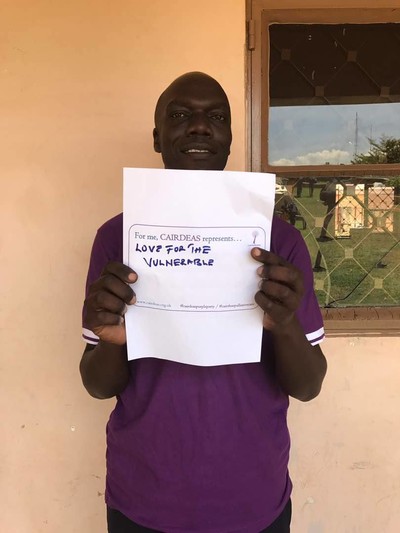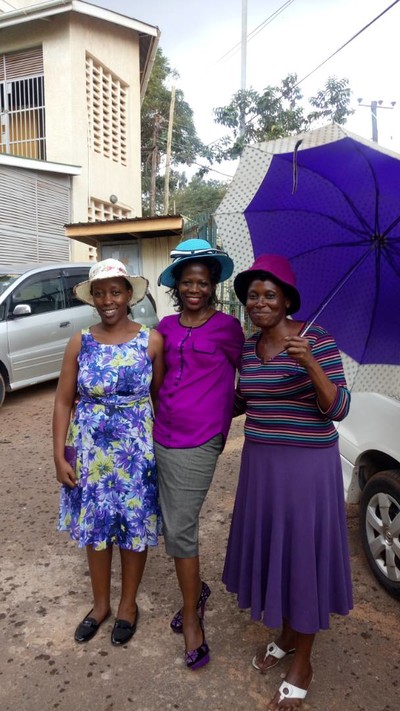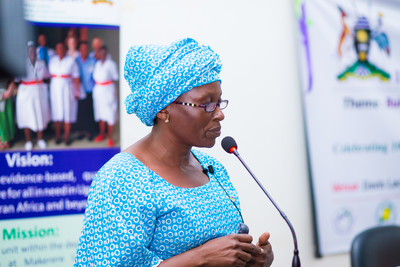
Bringing Hope to Uganda as a Volunteer
![]() Cairdeas
Cairdeas
![]() 8th March 2019
8th March 2019
Toko Friday Santiago, a volunteer for PcERC in Uganda shares a story of how he brought hope to a refugee with terminal cancer...
Rita (not her real name) was a 49 year old refugee from Congo who was diagnosed with breast cancer which had spread to her lungs. She was married with two children, 24 and 15 years old. Rita's husband was her main caretaker. After spending several weeks on the surgical ward in Mulago hospital she was referred to the palliative care team by the surgical doctors for pain and symptom control. Being a member of the multidisciplinary team (MDT) as volunteers, we visited her and her husband. Though we had challenges with communicating with them because of a language barrier, we managed to establish a good rapport with both the patient and caregiver through an interpreter. We became very good friends and she was able to open up and share a lot of information regarding her fears and concerns about her illness. She was concerned whether she would be able to get treatment and a cure for the disease and feared she may end up dying and never to see her children again. 'I don’t have money, I can’t even afford investigations', she lamented.
“I want a cure; I want to go back to Congo and see my house and children”
Her main distress was overwhelming pain, an inability to walk and difficulty with breathing. She was bed bound and could not even turn in bed. The team prescribed her oral morphine, which the volunteers helped to get from the pharmacy and also educated her husband on how to give morphine, explaining that this will reduce her pain and improve her breathlessness. She was also encouraged to adapt to a sitting up position and other breathing techniques which would make her as comfortable as possible. Practically the volunteers were able to pick her drugs from the pharmacy and also help translating English language to the patient and family since they could only communicate in French and Swahili. We were able to liaise with Inter Aid, an organization that supports Refugees, who helped with providing food and upkeep to enable her to stay on the ward. After a few weeks her symptoms were managed, a biopsy was done and referred to the cancer institute. Unfortunately, she was asked to do more investigations – pre-cancer treatment – but she was unable to do this due the financial constraints. As volunteers we continued visiting her on the ward, spending time with her and at times praying with them. They were very grateful to us and the palliative care team saying… 'you are angels from God... We are refugees but God has sent you to visit us and comfort us please come always!'. We continued to liaise with the social work team but it became difficult to raise funds for her investigations. This was quite distressing for the patient, caregiver and us as volunteers. She was then discharged back to the Refugee camp and as she was leaving she said she was very grateful to us for the love, care and support given to them as strangers and wished God’s blessings. 'At least let me go and see my children before I die!' Said Rita as she left the ward. Inter aid organized her transport back to the refugee camp. Her husband called to inform us of her death 2 weeks later. May her soul rest in peace.

Toko showing what palliative care means to him
Bringing Hope to the Hopeless - Dr Elizabeth Namukwaya
![]() Cairdeas
Cairdeas
![]() 6th March 2019
6th March 2019
Mercy (not her real name) is an elderly lady who was referred to our palliative care unit because she had severe uncontrolled pain. She was diagnosed with breast cancer 1 year prior to the time we had seen her and only managed to come to hospital for treatment 3 out of the 6 times that had been planned for her because she could not meet the transport expenses to hospital. She lived far from the hospital, did not have a job, and although she had children she was estranged from them. She had not seen them for two years and she lived alone. Our team was asked to be part of Mercy's care to control her pain which was very severe and would make her scream out loud on the ward. She could not sleep all night, was fatigued and could not walk as the pain became worse on any slight movement. She was a devout born again Christian and when we first saw her she was crying out to Jesus to help her and also kept on referring to her being attacked by satan causing this pain. Our team assessed her and managed her pain and our team of volunteers offered her practical support that included getting her to different areas where she needed to have her tests, xrays and scans done on a wheel chair. With our patient comfort fund (donations to our team to help patients who cannot meet basic needs) the team bought her food and other essential utilities. The volunteers also recognised that she needed a spiritual community, they supported her spiritual needs by regularly visiting her, talking and listening to her and praying with her. Her pain was almost completely controlled in a week’s time, she became independent and was able to do activities of daily living without support. She said to our team ‘Jesus has answered my prayers by bringing you to me. Even if my children do not support me or visit me I have got you as my children now. I have always dreamt of the day I would be able to walk again without pain hindering me and now I have got what I prayed for, I can sleep now and I can even laugh’ She was later started on chemotherapy and discharged. She has come back twice now for chemotherapy walking without any support. She always contacts us when she comes to hospital and she feels she is also obliged to bring hope to other patients when she comes to the ward. She told us that we brought hope to her when she became free of suffering and now she devotes her time to give hope to other patients on the ward by supporting them and giving them psychological and spiritual support.

Liz Namukwaya (left) with her friends and colleagues, Grace and Elizabeth
Bringing Hope to a Person With None - Elizabeth Nabirye, Clinical team
![]() Cairdeas
Cairdeas
![]() 6th March 2019
6th March 2019
Palliative care is about quality of life at any point during the trajectory of an incurable illness. It is more about life than about death. When the hope for a cure is gone we need to redirect the patient and family's hope for something more realistic and achievable.
Palliative care clinicians struggle with maintaining hope in the face of life-threatening illnesses with poor prognoses. However, can we foster true hope and not false hope or hopelessness in our communications with patients and families? Inspiring hope in ourselves as clinicians also has a healing effect on us and can help prevent burnout and increase resilience to the stressors inherent in challenging work situations. Within the context of communication on prognosis and end-of-life issues, however, we perceive patients’ hope as difficult and sometimes experience an ethical dilemma between maintaining patients’ hope and truth telling, which may diminish hope.
FN was a 28-year-old female, a single mother of a 12-year-old daughter, lying on a mattress on the floor of the cancer ward. Weak and emaciated she was clearly in her last days of life. She had cervical cancer and HIV/AIDS, but despite her illness she smiled as she held my hand. I found it hard to hold back the tears. We chatted for several minutes and she told me that at one time she had a good life but then she was diagnosed with HIV/AIDS and later cervical cancer. Most of her family abandoned her including the father of her 12-year-old daughter. She was suffering not only from physical, but also spiritual pain. She had spent many sleepless nights and kept asking, ‘why me?’; wondering if God cares. Oral morphine was prescribed for her physical pain and was effective in making her comfortable. FN was counseled about her disease prognosis and potential treatment outcomes and we made mutual goals of care. From then she kept saying God loves her and our team were angels from God. For FN, the biggest concern was getting her daughter educated after she died. Thank God we managed to get in touch with the father of her daughter. We met him and he promised he would take full responsibility of their daughter! This was a big relief and assurance for FN. She died peacefully on the ward after knowing that her daughter would get an education, even when she is long gone. Since then I have met many other FNs, desperately poor people with terminal illness who are crying out for help and support. Patients may have more goals and priorities besides living longer. Together we can do more.
NS was a 17 year old female with advanced abdominal tumour who had just completed high school. She suffered severe abdominal pain, distension and vomiting as a result of malignant bowl obstruction. She was the first borne out of 4 and her main carer was her mother, a single parent who converted from being a Moslem to a born again Christian in anticipation for a miracle for her daughter. The mother had spent everything to ensure that the daughter survived and she had now become financially constrained with very little support from the close family. Meanwhile NS’s condition continued to deteriorate. It was at this point that the palliative care team was consulted to see the NS for symptom management and end of life care. Children with cancer commonly suffer physical and emotional symptoms affecting their quality of life and the parents to these children with cancer feel lost and experience emotional conflict because of an inability to accept the suffering and reality of losing their children. Palliative care can improve the quality of life for children and their families. Although in reality, even with palliative care there can be despair and prolonged grief for parents involved and loss of hope. I was able to do an assessment of NS’s physical symptoms and these were very distressing both to the patient and mother. Though very challenging we eventually managed to control these symptoms. This symptom control gave a lot of relief to the mother and gave some hope as she waited on a miracle cure for her daughter from God. We are therefore vital in the continuous assessment and addressing of parents' spiritual needs, with the involvement of family and religious leaders.
Hope for cure has traditionally been the patient’s best friend and the clinician’s strongest ally. Clinicians may avoid discussing their patients’ poor prognoses with them for fear that this might destroy their hopes. However, patients with serious illness usually want to hear the truth from their clinicians and benefit from knowing the facts. By still hoping for a miracle and surrendering to God, the parents show that they cannot be separated from their relationship with God. Amidst a seemingly hopeless situation, I noted that NS's mother became more at peace, with ongoing counseling and support. NS died on the ward but her mother called to thank me for the support saying she was hopeful that her daughter gone heaven.

Elizabeth speaking at a palliative care conference
